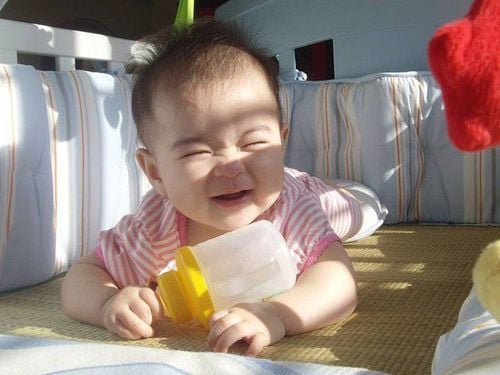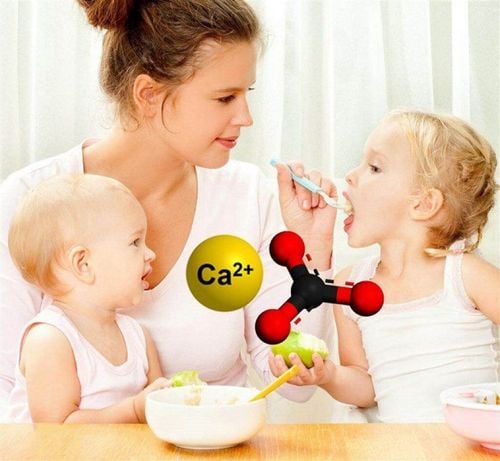This is an automatically translated article.
The article is professionally consulted by Master, Doctor Nguyen Thi An - Pediatrician - Neonatologist - Department of Pediatrics - Neonatology - Vinmec Ha Long International General Hospital.Crying is a completely normal physiological state and nothing to worry about during the natural development of a baby. However, the night crying with abnormal signs may signal that the child is suffering from dangerous diseases, including rickets caused by vitamin D deficiency.
1. The role of vitamin D in the body
Vitamin D plays a very important role for the human body, especially infants and children in the adult stage.
Role of vitamin D in the body:
Vitamin D is involved in creating bone structure for the body through the mechanism of calcium and phosphorus distribution. In the digestive tract, vitamin D increases the ability to absorb calcium and phosphorus from food Bone tissue Vitamin D is also a substance that helps regulate the homeostasis of calcium and phosphorus in the body. In addition, vitamin D also plays a role in the process of cell division, secretion and metabolism of hormones, differentiation of some cancer cells such as skin cancer, bone, and breast cancer cells.
2. Causes of vitamin D deficiency in children
Causes of vitamin D deficiency in children are diverse, including:
The mother is deficient in vitamin D during pregnancy and lactation. Prolonged breastfeeding is also one of the causes of vitamin D deficiency in children because the longer a child is breastfed, the less vitamin D is present in breast milk. Children are not exposed to sunlight early in the morning or are always covered too carefully when going out. The baby's mother put too much sunscreen on her baby's skin. Children with dark skin. Children have diseases related to the metabolism of vitamins, especially vitamin D. Their diets are limited or almost do not eat fish.

Các bà bầu nên bổ sung vitamin D
3. Signs to recognize vitamin D deficiency in children
Early signs of vitamin D deficiency in children:
Early signs: The first signs that a child lacks vitamin D are often related to the child's nervous system. When vitamin D is deficient, children often cry, have trouble sleeping, have trouble sleeping, sleep or startle due to nervous stimulation. In addition, children also have hair loss on the nape of the neck (signs of licking), pale skin, enlarged spleen, retarded physical development, decreased muscle tone, besides, children also have a lot of night sweats right away. even when it's cold. Late signs : After neurological signs are signs of bone disorders. Children are slow in teething and grow unbalanced, slow to roll over, crawl, walk... The fontanel is wide, the fontanel margin is soft, and the fontanel is slow to heal compared to other normal children. The child's skull is deformed, the skull is soft and concave, but returns to normal when the hand is lifted. The skull bones of children appear tumors, usually in the forehead, the apex. The head of the child's wrist bone is large and enlarged to "Wrist". The child's chest is deformed, the legs are bent, the spine is curved. Children can have convulsions due to hypocalcemia when vitamin D deficiency. Rickets is a very common disease in young children with prolonged vitamin D deficiency. Manifestations of children with rickets include deformed legs and delayed physical development. The bone deformity in childhood can leave many sequelae for the child's adulthood: The child's spine may be hunched, crooked, and narrow in the pelvis.
4. Children often cry at night lack of substance
From the causes and signs of vitamin D deficiency in children, children often cry at night, often signaling to parents that children are deficient in vitamin D.5. How to prevent vitamin D deficiency and rickets in children
The simplest way to prevent vitamin D deficiency is a proper diet and sunbathing for children.Diet Should give children a variety of foods with all 4 groups of substances. Prioritize the supplementation of foods rich in vitamin D such as fish, egg yolks, liver, fish oil,... However, you should only provide enough, should not provide too much vitamin D. calcium-rich foods to prevent rickets in children such as shrimp, crab, fish, milk, flan, should choose small fish with bones, shrimp and shrimp with shell because these foods contain more calcium. It should be noted that calcium in milk is more easily absorbed than calcium from other food sources.
When supplementing with vitamin D, it is necessary to combine with foods rich in fat from oil and fat because fat helps to increase vitamin D absorption.
In addition, it is necessary to add enough protein, vitamins and other minerals such as magnesium, zinc,. ..
For pregnant and lactating mothers, it is necessary to supplement with adequate nutrients, especially in the last months of pregnancy, mothers should use foods rich in calcium, vitamin D, and phosphorus. .
It is necessary to supplement vitamin D for mother and baby by taking a prophylactic dose as prescribed by specialist doctors.
Support, encourage, educate and guide mothers to breastfeed their children: it is necessary to advise mothers to breastfeed their babies within the first hour after birth, to breastfeed exclusively until 6 months of age and continue to breastfeed for up to 24 months.
Proper sunbathing for mothers and babies Proper sunbathing helps provide 90-95% of vitamin D for children. When sunbathing, it is necessary to wear a hat, wear sunglasses to avoid direct sunlight on the child's head, note that creams should not be used to apply to the skin while the child is in the sun.
Pregnant and nursing mothers should sunbathe daily, 15-20 minutes a day before 8 am or 4-5 pm, need to expose their feet and hands when exposed to the sun.
Children need to be in a cool, well-lit place. Children should be sunbathing daily from the first month after birth, exposing their legs, arms, back, belly, and chest to expose their skin to the sun. Sunbathing time for children: 15-20 minutes in the morning before 8 am or 4-5 pm.
Need to supplement vitamin D for children at risk or already deficient in vitamin D according to the dose prescribed by the doctor.
In summary, the child's abnormal night crying accompanied by the above-mentioned signs can be caused by many causes, but the most common cause is vitamin D deficiency. Therefore, mothers need to know to take care of their children in the most effective way, without affecting the child's development, especially bone development.

Tắm nắng đúng cách cho mẹ và bé
Please dial HOTLINE for more information or register for an appointment HERE. Download MyVinmec app to make appointments faster and to manage your bookings easily.













